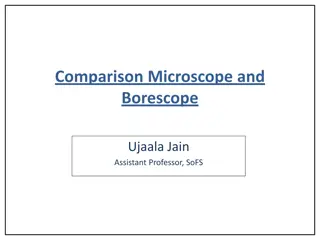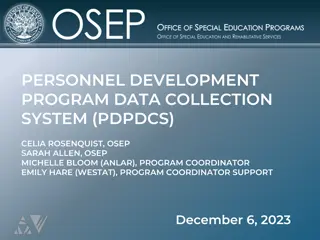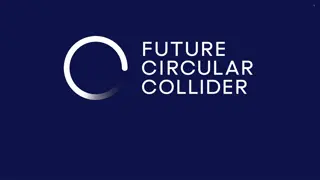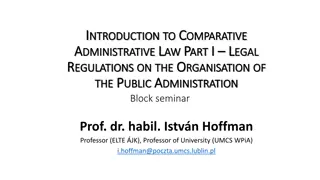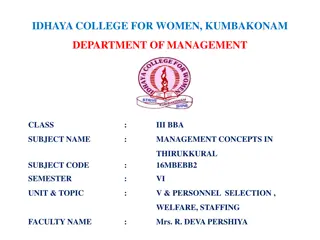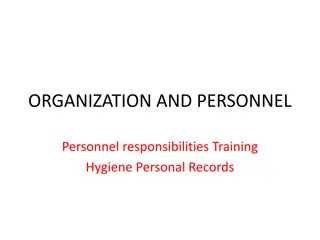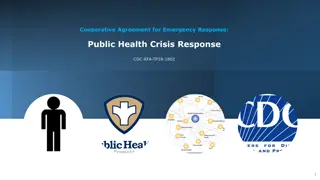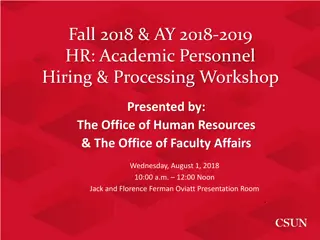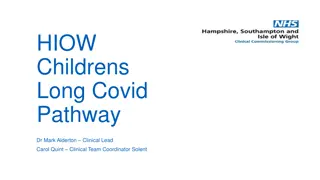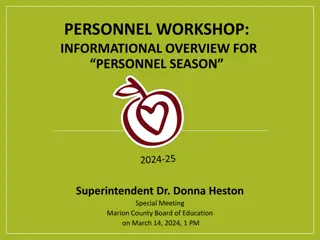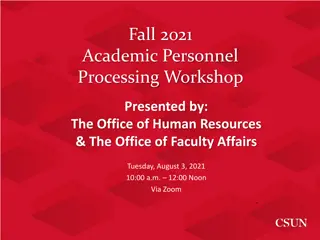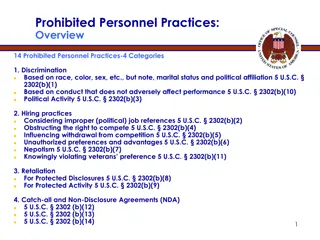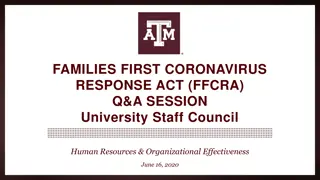Comparison of EPAL & EPSL: Overview of Academic Personnel COVID-Related Leaves
This overview delves into the Emergency Paid Administrative Leave (EPAL) and Emergency Paid Sick Leave (EPSL) programs for academic personnel amid COVID-19. It highlights the eligibility criteria, qualifying reasons for use, hours available, and operational feasibility for remote work or childcare commitments. The comparison details the differences and similarities between EPAL and EPSL, including specific scenarios where each type of leave can be utilized.
Download Presentation

Please find below an Image/Link to download the presentation.
The content on the website is provided AS IS for your information and personal use only. It may not be sold, licensed, or shared on other websites without obtaining consent from the author. Download presentation by click this link. If you encounter any issues during the download, it is possible that the publisher has removed the file from their server.
E N D
Presentation Transcript
Overview of academic personnel COVID- related Leaves and Programs EPAL: Emergency Paid Administrative Leave EPSL: Emergency Paid Sick Leave Reminder Stop the Clock APM 710 sick leave/paid medical leave exception for childcare COVID-related Dependent Care Modified Duties
Comparison: EPAL & EPSL (1 of 3) Summary of the two COVID-19 related paid leave provisions potentially available to academic appointees. UC Expanded Paid Administrative Leave (EPAL) 2021 Emergency Paid Sick Leave (EPSL) 128 hours or 16 days for FTE prorated for part-time appointees 80 hours for FTE or the two-week equivalent for part-time appointees March 1, 2020 June 30, 2021 March 29 September 30, 2021 No prior service requirements No prior service requirements Can be taken intermittently, and for exempt appointees is recorded in whole days. For hourly appointees, leave taken is entered in hours. See FAQ 11 Pg. 6
Comparison: EPAL & EPSL (2 of 3) UC Expanded Paid Administrative Leave (EPAL) Qualifying reason for use unable to work or telework because of: 1. Appointee s own COVID-19 related illness or that of a family member* 2. Appointee directed not to come to worksite for COVID-19 related reasons and/or worksite has COVID-19 related remote work program or is under shelter in place order and it is not operationally feasible for employee to work remotely 3. COVID-19 related school or daycare closure requires appointee to be at home with child/dependent and it is not operationally feasible for appointee to work remotely or in conjunction with childcare commitment The use of EPAL shall not adversely affect the delivery of essential University services. Instruction is an essential service of the University. Instructors are not eligible to take EPAL during their scheduled remote lectures/class sessions for criterion 3 above. *Pursuant to APM - 715-0(b), family member is defined as an appointee s child, parent, spouse, or domestic partner (same sex or opposite sex).
Comparison: EPAL & EPSL (3 of 3) 2021 Emergency Paid Sick Leave (EPSL) Qualifying reason for use unable to work or telework because of: 1. Quarantine or isolation order 2. Told by health care provider to self-quarantine 3. (a) appointee is experiencing COVID-19 symptoms and seeking a medical diagnosis; (b) appointee has been exposed to COVID-19 and is seeking or awaiting the results of a diagnostic test for, or a medical diagnosis of, COVID-19; (c) the University has requested that appointee obtain a diagnostic test for, or a medical diagnosis of, COVID-19, and appointee is seeking or awaiting those results; (d) appointee is obtaining immunization related to COVID-19; or (e) appointee is recovering from injury, disability, illness, or condition related to obtaining COVID-19 immunization 4. Caring for individual subject to quarantine/isolation order or who was told by health care provider to self-quarantine 5. Caring for child whose school/place of care is closed or child care provider unavailable b/c of COVID-19 6. Other substantially similar condition specified by HHS Secretary
Reminder (1 of 2): Stop the Clock, APM 133-17 h. Childbearing or Childrearing To care for any child who is or becomes part of the faculty member s family. To be eligible to stop the clock, a faculty member at the Assistant level must be responsible for fifty percent (50%) or more of the care of the child. Serious Health Condition Including Disability or Bereavement When the faculty member s ability to pursue University duties is significantly disrupted by a serious health condition or disability, by the need to care for a close family member who is seriously ill, or by the death of a close family member. Significant Circumstance or Event For reasons due to a significant circumstance or event beyond the faculty member s control that disrupts the faculty member s ability to pursue University duties. Examples of significant circumstances or events beyond the faculty member s control for which the faculty member may request to stop the clock include the effects of a natural disaster or the effects of significant delays in the provision of research space, facilities, or resources committed to the faculty member and necessary for the faculty member s research activities.
Reminder (2 of 2): Stop the Clock, APM 133-17 h. A faculty member may be granted no more than two (2) years of extension during the probationary period. A faculty member is eligible to stop the clock even if the faculty member does not take a formal leave or have a modification of duties. A request to stop the clock should be made as soon as the need becomes apparent. A third Stop the Clock may be requested on an exceptional basis and requires approval by the Office of the President. Given the frequency this exception may be required, the Office of the President developed a form for Academic Personnel to submit the exception to the Office of the President. A faculty member who has requested a Stop the Clock is not obligated to wait to pursue promotion to the Associate rank.
APM 710-11 Paid Medical Leave Exception for Childcare Temporary exception to APM - 710-11 to allow faculty who do not accrue sick leave to use any available paid medical leave allotment in the Fall 2020 quarter/semester if they were unable to work (or telework) because their children were not able to physically attend their school or place of care because of COVID-19 precautions. Note that on October 7, 2020, Provost Brown approved the two semester-based campuses, Merced and Berkeley, to defer this policy exception to Spring Semester 2021, given that instruction began in August to avoid disruptions to teaching, and potentially be more useful to faculty seeking relief. This exception applies to Senate faculty only, and it may NOT be used during Fall 2020. Under this temporary APM 710-11 exception, use of paid medical leave are permitted for up to one course reduction for childcare-related reasons. If any faculty member requests to use APM 710 for childcare in Spring semester, the Schools must work closely with APO to determine how much time this represents for the purposes of decrementing APM 710. This exception will be effective January 1, 2021, through May 18, 2021. More information may be found on our APO Website.
Process to Request APM 710 Sick Leave/Paid Medical Leave Exception for Childcare The temporary exceptions APM - 710-11 do not affect eligibility for Emergency Paid Sick Leave (EPSL) or Expanded Paid Administrative Leave (EPAL) provided by University policy. EPSL and EPAL may be taken before or after any accrued sick leave or paid medical leave is used or exhausted. After consultation with the department chair and dean, the academic appointee works with the school to complete the new Leave of Absence Request form Paid Medical Leave (APM 710) for Childcare (attached for your convenience and available on our website at (https://academicpersonnel.ucmerced.edu/sites/academicpersonnel.ucmerced.edu/files/doc uments/paid_med_leave_apm710_covid-child-care_leave_of_absence_request.pdf) School works with APO to determine percentage portion for decrementing APM 710 for Senate faculty School routes completed form to Esmeralda Martinez <emartinez35@ucmerced.edu> in APO for further processing APO will work on obtaining approval from Vice Provost for Academic Personnel APO will send email approval notification for paid medical leave for childcare
Interim COVID-Related Dependent Care Modified Duties Senate faculty under the purview of Academic Personnel Manual 760-28(a) and with dependent care responsibilities of 50% time or more will be eligible for up to two academic terms of Interim COVID-Related Dependent Care Modified Duties during academic years 2020- 2021 and 2021-2022. Interim COVID-Related Dependent Care Modified Duties will cover dependents of all ages, including children and dependent adults and elders. Full-time Senate faculty members who are considered for Interim COVID-Related Dependent Care Modified Duties will remain full-time employees of UC Merced and continue to accumulate all benefits and sabbatical credits while serving the University. Furthermore, Interim COVID-Related Dependent Care Modified Duties will not be considered in assessing personnel cases or affect future requests for Active Service Modified Duties; it will not adversely affect how a candidate s dossier is considered by the department, the dean s office, or the Committee on Academic Personnel (CAP). With the exception of Fall 2020, such requests should be initiated no later than three (3) months prior to the beginning of the semester in which the modified duties will occur. Chairs, with input from deans, will work to accommodate requests on a case-by-case basis, considering the curriculum of the department, the need to offer required courses, availability of alternative instructors, and number of individuals requesting these modified duties in the same term.
Examples of COVID-Related Dependent Care Modified Duties Interim COVID-Related Dependent Care Modified Duties might include any of the measures, or a combination thereof, on the following list, which is not exhaustive: Offer relief from service obligations and responsibilities for all or part of an academic term. Allow flexibility in classroom instruction modality, for instance, synchronous versus asynchronous, remote versus in-person, and scheduling. Provide flexibility in department course offerings, for instance, reducing the overall number of courses while increasing sections of or enrollments in courses that will indeed be offered. Allow voluntary deferral of sabbatical leaves. Offer flexibility with instructional roles, for instance, co-teaching with others (Senate faculty, Unit-18 lecturers, advanced graduate students or postdoctoral scholars). Provide teaching release in return for temporary increase in course-load after dependent care can be secured. Faculty members who want to apply for Interim COVID-Related Dependent Care Modified Duties should fill out an Application Form. The application will be reviewed by the faculty member s department chair, dean, and the Academic Personnel Office. Note: Faculty are not eligible for Interim COVID-related Dependent Care Modified Duties in the same semester that they are receiving exceptional leave to use sick leave or paid medical leave (i.e. APM 710-11 or APM 710-20) because their children are not able to physically attend school or place of care because of COVID-19 precautions. More information may be found on our APO Website.





